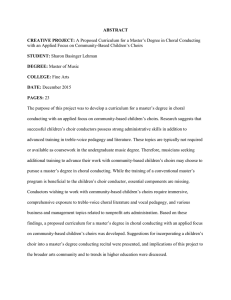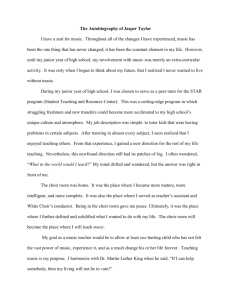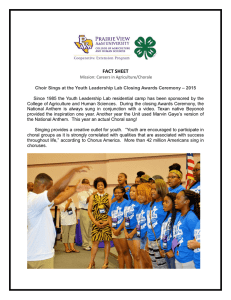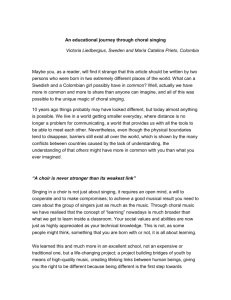Project Title Background Student Name, major; Mentor Name, department
advertisement
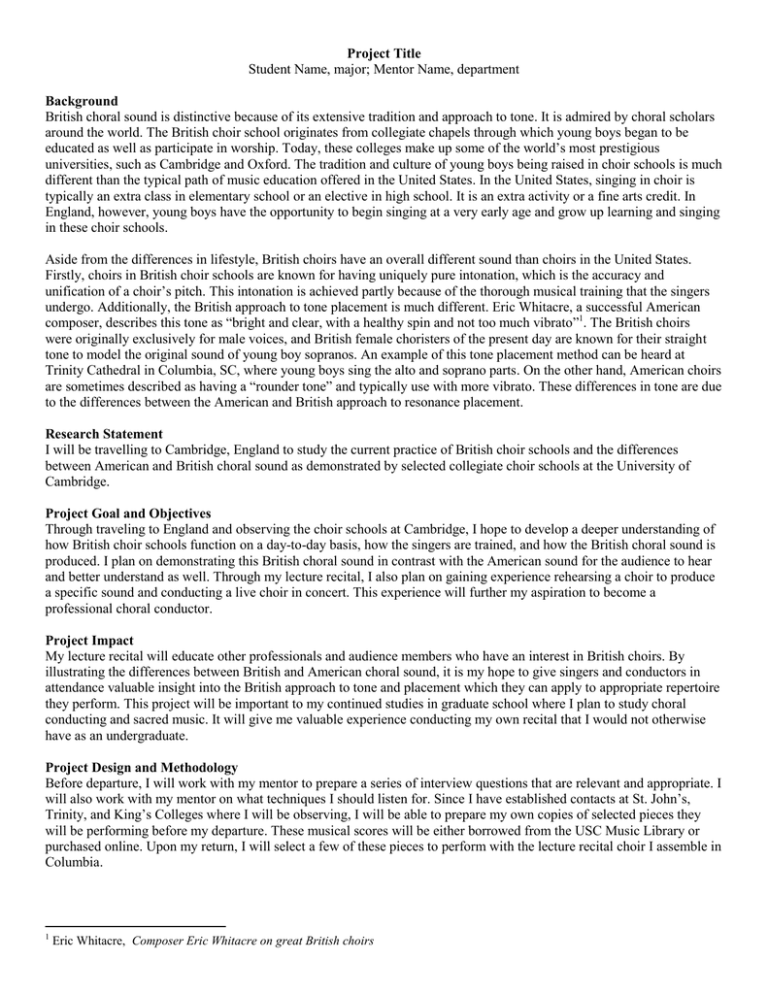
Project Title Student Name, major; Mentor Name, department Background British choral sound is distinctive because of its extensive tradition and approach to tone. It is admired by choral scholars around the world. The British choir school originates from collegiate chapels through which young boys began to be educated as well as participate in worship. Today, these colleges make up some of the world’s most prestigious universities, such as Cambridge and Oxford. The tradition and culture of young boys being raised in choir schools is much different than the typical path of music education offered in the United States. In the United States, singing in choir is typically an extra class in elementary school or an elective in high school. It is an extra activity or a fine arts credit. In England, however, young boys have the opportunity to begin singing at a very early age and grow up learning and singing in these choir schools. Aside from the differences in lifestyle, British choirs have an overall different sound than choirs in the United States. Firstly, choirs in British choir schools are known for having uniquely pure intonation, which is the accuracy and unification of a choir’s pitch. This intonation is achieved partly because of the thorough musical training that the singers undergo. Additionally, the British approach to tone placement is much different. Eric Whitacre, a successful American composer, describes this tone as “bright and clear, with a healthy spin and not too much vibrato”1. The British choirs were originally exclusively for male voices, and British female choristers of the present day are known for their straight tone to model the original sound of young boy sopranos. An example of this tone placement method can be heard at Trinity Cathedral in Columbia, SC, where young boys sing the alto and soprano parts. On the other hand, American choirs are sometimes described as having a “rounder tone” and typically use with more vibrato. These differences in tone are due to the differences between the American and British approach to resonance placement. Research Statement I will be travelling to Cambridge, England to study the current practice of British choir schools and the differences between American and British choral sound as demonstrated by selected collegiate choir schools at the University of Cambridge. Project Goal and Objectives Through traveling to England and observing the choir schools at Cambridge, I hope to develop a deeper understanding of how British choir schools function on a day-to-day basis, how the singers are trained, and how the British choral sound is produced. I plan on demonstrating this British choral sound in contrast with the American sound for the audience to hear and better understand as well. Through my lecture recital, I also plan on gaining experience rehearsing a choir to produce a specific sound and conducting a live choir in concert. This experience will further my aspiration to become a professional choral conductor. Project Impact My lecture recital will educate other professionals and audience members who have an interest in British choirs. By illustrating the differences between British and American choral sound, it is my hope to give singers and conductors in attendance valuable insight into the British approach to tone and placement which they can apply to appropriate repertoire they perform. This project will be important to my continued studies in graduate school where I plan to study choral conducting and sacred music. It will give me valuable experience conducting my own recital that I would not otherwise have as an undergraduate. Project Design and Methodology Before departure, I will work with my mentor to prepare a series of interview questions that are relevant and appropriate. I will also work with my mentor on what techniques I should listen for. Since I have established contacts at St. John’s, Trinity, and King’s Colleges where I will be observing, I will be able to prepare my own copies of selected pieces they will be performing before my departure. These musical scores will be either borrowed from the USC Music Library or purchased online. Upon my return, I will select a few of these pieces to perform with the lecture recital choir I assemble in Columbia. 1 Eric Whitacre, Composer Eric Whitacre on great British choirs During my stay at Cambridge, I will attend rehearsals and concerts at St. John’s, Trinity, and King’s Colleges as well as conduct interviews with the singers and the conductors. In the interviews with singers, I will ask further questions about their lifestyle, daily schedule and how long they have been singing. I will ask the conductors about my observations from rehearsals in addition to their personal approaches to tone placement and intonation within a choir. During rehearsals, I will observe the style of rehearsal in general, conducting style, and the different sounds developed by each choir in contrast to the sound produced by the choir in which I sing, the USC Concert Choir. Finally, I hope to sit in on at least one voice lesson in order to study the vocal technique beyond choir rehearsal and better understand the British approach to tone placement. I am equipped to make these observations through my own extensive experience with singing in choir and 3 years of collegiate voice lessons. I will be able to contrast rehearsal technique, conducting style and choral sound with the USC Concert Choir as well as other American choirs that I have heard. I will be in communication with my mentor via e-mail throughout my stay to ask her questions if needed. The choir I conduct in my recital will consist mostly of singers from the choirs in the School of Music but may also contain singers that I know from local church choirs, such as ones in which I have previously sung (First Presbyterian Church and Washington Street Methodist). I will hire 4 section leaders in the summer—a soprano, an alto, a tenor, and a bass—to be in charge of their section and to give me feedback about how well the section is doing with the music. Throughout the process of preparing my recital, I will take applied conducting lessons with my mentor in which we will address both conducting gesture and rehearsal technique. I have experience leading sectional rehearsals in concert choir as well as working with a choir to perform one of my own pieces last semester, so I am comfortable rehearsing and working with choirs. Because my mentor is currently my conducting professor, she has a firm understanding of my strengths and weaknesses as a conductor. Project Timeline April - May 2014 – Meet with my mentor to prepare interview questions, discuss the observation process, and create a tentative outline of the lecture recital to be given in the fall; correspond with contacts from Cambridge to prepare schedule; gather references. June 1st-15th, 2014 – Travel to Cambridge, England and observe rehearsals and concerts at St. John’s, Trinity and King’s College. June – July 2014 – Prepare pieces to be conducted and begin compiling lecture information; contact singers and assemble choir of 16-20 singers; create tentative rehearsal schedule; book a date for the recital in the School of Music Recital Hall through the music office. August - September 2014 – Rehearse with choir to learn the music; prepare correct sound and practice conducting; take lessons and meet with my mentor to debrief rehearsals and discuss my conducting technique. October 2014 – Give lecture recital in the School of Music Recital Hall. February 2015 – Present research poster at ACDA National Conference. Final Product I will present my research in the form of a lecture recital to be given in October of 2014. This recital will be held in the Recital Hall at the School of Music and will include a lecture on my research as well as musical examples using a choir of 16-20 singers. The choir will sing relevant British repertoire as well as contrasting American repertoire and will be used throughout the lecture to demonstrate the British choral sound that I observe during my stay at Cambridge. Finally, I will submit a proposal to present my research at the American Choral Director’s Association National Conference in Salt Lake City, Utah in February of 2015. Personal Statement I have been involved in choral music since elementary school. I started out in church choir and eventually began to sing in my school choir. Singing in choir has taught me how to work in a team to create something beautiful. It has enhanced my musical skill and ear training. Finally, the choir directors I have had and the people I have met have instilled in me the goal of becoming a choral conductor and working with choirs for the rest of my life. For these many reasons, I feel that it is important for me to travel to England, the place where the choral tradition is both historically strong and currently thriving. This will give me the opportunity to observe some of the finest choirs in the world, and to learn as much as I can about the form of music-making that is near and dear to my heart. Equally exciting to me is the opportunity to bring back what I learn about this choral tradition and create a program of my own. I know the moving power that a strong choir can have on any person and I want this process to become my career. Therefore, it would be a great honor to begin my choral conducting career through the Magellan Scholar program and instill in the audience members the passion that I have for this art. References Sandborg, Jeffrey R., and John Rutter. English Ways: Conversations with English Choral Conductors. N.p.: Hinshaw Music, 2001. Print. Cruttenden, Alan. Intonation. Cambridge: Cambridge UP, 1997. Print. Quadros, André De, ed. The Cambridge Companion to Choral Music. Cambridge: Cambridge UP, 2012. Print. Whitacre, Eric. "Composer Eric Whitacre on Great British Choirs." Gramophone.co.uk. MA Business & Leisure Limited, 10 Dec. 2010. Web. 13 Feb. 2014. B., E. "British Cathedral Music: A Plaintive Tune." The Economist. The Economist Newspaper, 25 July 2013. Web. 13 Feb. 2014. Emmons, Shirlee, and Constance Chase. Prescriptions for Choral Excellence: Tone, Text, Dynamic Leadership. Oxford: Oxford UP, 2006. Print.f Choir of St. John’s College, Cambridge, English Choral Music.Naxos, 2005. CD. The Cambridge Singers, John Rutter, There Is Sweet Music. Collegium. 1986. CD. Budget: Student salary Hours Rate Enter the estimated number of hours student will work Subtotal Enter the hourly wage Taking classes Not taking classes $0.00 Fringe: Student salary * student fringe rate Taking classes Not taking classes 1 $0.00 $0.00 $0.00 $0.00 $0.00 $0.00 Materials/Supplies Enter sub-total from below: $400.00 Travel Enter sub-total from below: $2930.08 TOTAL: $3330.08 Amount requested for MGS award: $3000.00 Budget Justification: Travel to Cambridge, England: $2930.08 Roundtrip Flight via American Airlines: $1460 Nashville, TN (BNA) to London, UK (LHR) Sunday, June 01, connecting in Chicago, IL London, UK (LHR) to Nashville, TN (BNA) , connecting in Chicago, IL Bus from London to Cambridge, England: approx. $20 Food at Cambridge: Continental breakfast provided by dormitory $40 per day for lunch and dinner/16 days = $640 Housing at Cambridge: Junior Guest Room at Cambridge: $ 50.63/night for 16 nights = $810.08 Travel to ACDA conference: approx. $1000 including flight and housing Materials and Supplies: $400.00 $100 per section leader x4 = $400 Total: $3330.08 Requesting from Magellan: $3000 I am applying for the Magellan Mini-grant, Walker Institute and the School of Music Study Abroad Scholarship. Should I receive any of these, they will fund the remaining amount in addition to travel expenses for presenting at the ACDA conference, or I will pay the remaining amount out of pocket.
